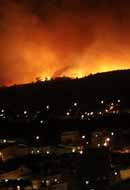Fire and Resilience

Along the flanks of Israel's Carmel range, just below the scene of the past days' cataclysm, it is possible to see, in ancient caves whose ceilings are caked with millennia of soot, some of the earliest evidence of the human use of fire.
For Mediterranean peoples, fire has been part of life for over 100,000 years. Hunter-gatherers would set fires to drive game from forests and later to clear plots of land for planting. The patchwork of burned spaces generated a mosaic of ecological diversity as plant and animal species colonized new niches. (Some plant species, such as Aleppo pine, even require fire for germination.) In these spaces, pressure by sheep and goats and the systematic exploitation of plants by humans shaped the collections of species that remain today. Humans were one of these species, and fire was a basic tool by which they established themselves. The Promethean gift cannot be relinquished.
Ecologically speaking, Israel and Lebanon share something important with California and western Spain. Such complexes of sea, westward-facing coastal plains, and inland mountain ranges and valleys are rare, and they manifest similar advantages and dangers. In California, forest fires are common, particularly when the offshore Santa Ana winds blow hot air from east to west, reversing the usual flow. And, as in California, Mediterranean fire danger has been compounded by human penetration further into the hills and the penning-up of the remains of forests in parks.
On average, there are 50,000 fires around the Mediterranean every year, cumulatively consuming an area of about 3,500 square miles: the size of Crete or Sardinia. July 2009 saw enormous conflagrations in Spain, France, Greece, and Sardinia. In 2007, one fire alone burned over 370,000 acres in Greece and killed almost 70 people.
In this light, the help Israel received from France, Turkey, Bulgaria, Jordan, and others is not surprising, and constitutes no sort of foreign-policy breakthrough. The Euro-Mediterranean Council for Burns and Fire Disasters (also known as the Mediterranean Burns Club), based in Palermo, Sicily, is but one important center of disaster-preparedness and medical training that Israel and another 21 countries belong to. It was started in 1983 on the premise that, "despite their differences and divergences, people and countries around the Mediterranean basin share a historical and cultural commonality, and that common health problems could be better addressed by a regional approach." Fire transcends borders and politics, and tomorrow or next year another country will be needing help from its Mediterranean neighbors.
Moreover, and contrary to the wisdom of Smoky the Bear, fires cannot be prevented, and they cannot be outlawed. Laws against setting forest fires in the Mediterranean go back centuries, but over 95 percent of such blazes still result from negligence or arson, and the number is four times higher today than in the 1960s. Recent on-going drought is one reason, but most important is rural abandonment. The pastoral Mediterranean scenes we regard as natural landscapes are in fact carefully managed. Prescribed burning, the human-sanctioned actions of animals, and direct interventions like roads and terraces are integral elements in manipulating an environment that has not been "natural" since humans first arrived.
Only when humans leave for towns and cities or isolate vegetation in parks with little supervision does fire often seize the initiative and attempt to redress the balance. We then respond in horror, quite sensibly at the loss of life and property but less sensibly at a spectacle of destruction that is sometimes necessary and certainly inevitable. At the root of our horror is our separation from nature, but it should be accompanied by an acknowledgment of both our role and our responsibility in maintaining "natural" environments. Only we have the power to start the right types of fires.
As for the wrong types, even if the Carmel fires turn out to be the result of negligence, as it now appears, additional fires in the Galilee have been revealed as arson. Properly speaking, most of these are examples of terrorism or asymmetric warfare for which the country seems drastically unprepared. Blame is already being assessed for the criminal neglect of Israel's fire services, but the public has only now awakened to the possibility of much more terrible losses from infernos created by endless missile barrages, which would quickly overwhelm the country's courageous but puny fire and rescue resources.
Nor is fire the only such existential threat. What will be the result when an earthquake, for which Israel is long overdue, finally strikes? The quake of July 11, 1927 killed over 500 and landslides dammed the Jordan River for almost an entire day. (For perspective, the 2001 collapse of a wedding hall in Jerusalem killed 25 and injured 300.) Relocating infrastructure, enforcing zoning and building codes, and preparing rescue services are vital, but they will not prevent natural disasters. True preparedness lies in social and mental resilience.
The Carmel fires took place over Hanukkah, a holiday whose ascribed miracle consisted in flames that would not die. The reality of such flames is that they can be difficult to control. Literal green shoots will return to the Carmel in short order. Called for, as ever, are worthy men and women, shoots of resolute leadership sensitive to the fragile but necessary place of both humans and fire in the Mediterranean.
Alex Joffe is a research scholar with the Institute for Jewish and Community Research.
Comments are closed for this article.




